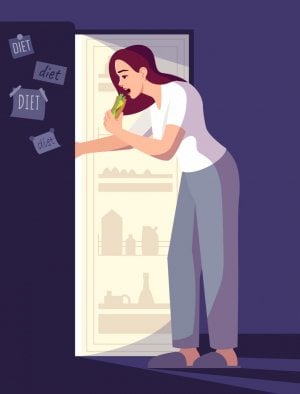SDC Rewards Member
Upgrade yours now
A
5 Tips to Become More Self-Disciplined and Quit Emotional Eating
We all know that feeling. You're not really hungry, but for some reason, you just can't help yourself. Before you know it, the entire tub of ice cream is gone, or that packet of biscuits has been demolished. Sound familiar?
Chances are, you're an emotional eater and don't even realise it!
In the same way, you might stick to a plan at the gym to lose weight, cutting out emotional eating requires planning and self-discipline. But keeping motivated and staying away from using food as a mood booster can be tough, especially if you’ve been doing it for a while.
In this article, we’ll discuss a few ways you can get rid of your habit, since giving up on it is easier said than done.

Emotional eating isn’t always when you’re sad. Do you reward yourself with ‘treat’ food? Image Credit: Shutterstock
Identify the reason you're eating
People will say 'So I never thought I was an emotional eater but my kid just went into the ER this weekend, and I found myself at the vending machine. Like, I had an emotional eating episode.'
Well, yeah! We're all emotional eaters. There's no person who is not an emotional eater at least some of the time. We are emotional beings and feel a host of emotions every single day, as well as eating three or more times a day. It's nearly impossible for them not to collide.
By identifying why you're eating the way you do, you may be able to retrain yourself and make more informed eating decisions.
Ask yourself: 'If I'm not hungry, why am I eating?' Are you eating the cake because you want to eat the cake? Is it a habit? Is it a form of comfort or self-sabotage even though you're not even tasting it? Is it because everyone else is eating? Is it because you have too much going on, and your life is really chaotic right now?
By identifying why and revealing your motivation, you can better understand your behaviour.
Something Purposeful
To relieve and release the pressures of life, we all want to surrender to our favourite comfort food at times. However, if you keep surrendering to the temptations of your preferred unhealthy treats just like that, it may be time to search for a more purposeful form of surrender.
Instead, why not try treating yourself to something new, like a massage, a pair of shoes, a book, a show, a nap, a ‘no’ to an invite or an event, a manicure, a holiday, or something else that feels indulgent and pleasurable?
Ease up on yourself
We all set high standards for ourselves. But it's important to remember that no one is perfect, and we all make mistakes. Sometimes it's even ourselves whom we're most disappointed in!
As a result, you may be letting self-judgement and shame convince you that you don’t deserve to make progress. But you do deserve second (and third and fourth) chances. Treat yourself to forgiveness.
Practice mindful eating
Mindful eating is a way of eating that is focused on being present in the moment. This means paying attention to your food, and eating slowly and without distractions. This can help you to avoid emotional eating, and to focus on making healthy choices.
Make a plan and be prepared
You are more likely to stick to your goals if you have a plan in place. Decide ahead of time what you will eat, and when you will eat it. This will help you to avoid making impulsive decisions that can lead to emotional eating.
Meal prep can also help you to stay on track with your eating goals. If you have healthy meals and snacks already prepared, you are less likely to make unhealthy choices when you are feeling hungry.
If you have concerns about your diet, weight loss plans or emotional eating, we recommend you chat with your GP about your options. There are lots of professionals who can help.
Do you struggle with emotional eating, members? I know I sure do so I’ll be trying the tips in this article.





